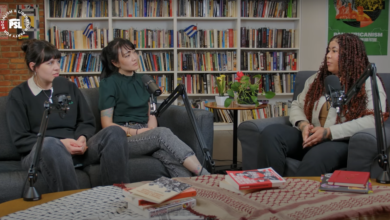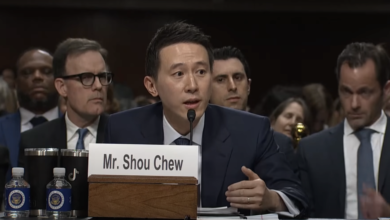 Protesters in al-Khaledia, Iraq demanding the release of three women arrested by U.S. troops, Oct. 23, 2003. Photo: Ali Abbas/EPA Photos |
This fact has generated a growing discussion within the worldwide antiwar movement: What attitude should opponents of the U.S. war take toward the Iraqi resistance?
I took part in this discussion during the July 31-August 1 Zenko National Assembly for Peace and Democracy Conference in Tokyo, Japan, as a representative of the ANSWER (Act Now to Stop War and End Racism) Coalition. Several hundred people from antiwar organizations from around the world took part in that conference.
All organizations at the conference agreed the occupation should end immediately. But a debate broke out over proposed language in the resolution supporting the “civil resistance” in Iraq. The language-and the debate within the conference-counterposed the “civil resistance” of certain Iraqi groups, like the Organization of Women’s Freedom in Iraq and the Union of Unemployed in Iraq, to the armed opposition. The armed opposition, the OWFI and UUI delegates argued, was led by “political Islam” and should be opposed.
I spoke on behalf of the ANSWER Coalition and made the point that there are two sides in Iraq. On the one side are those who are resisting occupation. On the other side are the imperialist occupation forces. I made the point that the global antiwar movement opposed the occupation of Iraq and must support those who are resisting the occupation of their country. We should not put conditions on our solidarity with the people of Iraq by insisting that the armed resistance must be condemned. In fact, armed resistance, with all the suffering that goes along with it, is the inevitable response by those who seek to reject the neocolonial takeover of their country.
For opponents of the U.S. war in Iraq, our attitude toward the Iraqi resistance is nothing less than our attitude toward imperialism. The question is not about supporting this or that group or this or that political perspective within the resistance forces. The armed resistance has been the major force that has kept the occupiers from setting up a puppet government in Iraq.
Speaking in code
Various groups are traveling around the world claiming to speak on behalf of Iraq’s working class. Those who have gained the widest hearing so far, both in the global antiwar movement and in the big business press, are those who in one way or another accept the legitimacy of the U.S. occupation. Counterposed against the armed resistance, “civil resistance” becomes a code for acceptance of the U.S. imperialist project and its puppet regime.
The most extreme example of this position is the one taken by the Iraqi Federation of Trade Unions, another group touted as part of the “civil resistance.” In October, IFTU delegates urged members of the British Labor Party to welcome U.S. puppet “Prime Minister” Iyad Allawi and lobbied Labor trade union affiliates to oppose a motion calling on British Prime Minister Tony Blair to set a date for withdrawing British troops from Iraq. (Statement of the Stop the War Coalition, Oct. 11, 2004)
The UUI and the OWFI have a more disguised approach. They have gained a hearing within the world antiwar movement based on their position of “two international terrorist camps represented by the U.S.-led coalition and political Islam.” (UUI’s “Voice of Iraqi Workers,” June 6, 2004) By portraying themselves as against both the U.S. occupation and the armed resistance, these groups curry favor with the most vacillating elements within the antiwar movement.
While it is interesting and instructive to read these groups’ political positions and statements, the most important point for antiwar activists is the attitude these groups take in Iraq toward the occupation forces. The IFTU, closely connected to the Iraqi Communist Party, supports the puppet government, and ICP leaders took part in the U.S. “Provisional Authority.” This is a far cry from that party’s historic role in the 1958 Iraqi anticolonial revolution.
The UUI’s position is less obvious-and more dangerous-because they give lip service to opposing the occupation forces. Their most prominent action was a sit-in staged by several hundred unemployed workers in July 2003 demanding that the U.S.-backed administration provide jobs or $100 a month to unemployed Iraqis.
Following that demonstration, a spokesperson of the Workers Communist Party of Iraq-the group to which many leaders of the UUI and the OWFI belong-told the French News Agency “his party had been given the green light by the United States to re-establish unions in several sectors such as railways, oil and electricity.” (AFP, Aug. 4, 2003)
The UUI supports increased reliance on U.S. aid to overcome social problems facing Iraqi workers. “If the Americans can’t provide us with jobs or money, it is possible that many people will soon join the terrorist organizations,” UUI lea der Qasim Hadi told Knight Ridder, Aug. 6, 2003.
A March 8 Washington Post report featured the UUI. That report revealed that the UUI seeks to act as an intermediary for foreign aid organizations and local councils in distributing jobs and aid. This goal is one of the explicitly stated goals on their website, along with the goal of being “officially recognized by the U.S.A. civil administration as the representative of the unemployed workers in Iraq.”
In other words, the UUI’s program accepts the central role of the U.S. military in providing jobs and resources-resources contingent on the project of stabilizing a puppet Iraqi government. The UUI and its allies are angling for a junior role in distributing these resources.
The Washington Post article also illustrated the UUI’s political role in maintaining social order in Iraq. “There’s no peaceful solution,” one unemployed Iraqi shouted at a UUI office, challenging UUI leader Hadi’s insistence on peaceful protests. “We have to use explosives. Only if we bomb the Americans will they understand that we need jobs.”
Armed struggle has mass support
That description provides a window into the social basis for armed resistance. Far from being the work of narrow political sectors or “foreign terrorist groups,” the Iraqi resistance represents wide hatred for the U.S. occupiers and the determination of the Iraqis to drive out the occupation.
The UUI’s characterization of the Iraqi resistance as “remnants of the Baath regime, nationalist, and Islamic groups” mirrors the propaganda of the occupation forces. But the few glimpses that come out through the Western big business press suggest that the Iraqi resistance has deeps roots within the whole Iraqi population.
For example, a Sept. 24 New York Times article presents the account of Turkish journalist Zeynep Turgul. Turgul and a Canadian were held captive by Iraqi resistance fighters for four days in September. “Everywhere they were taken, she said, people appeared to help any one they thought was part of the resistance.”
 Caneisha Mills speaking at Zenko conference. |
Journalist Patrick Graham, writing in the June issue of Harper’s Magazine, dispelled the notion promoted by the UUI of an isolated resistance. “It became clear, from the talk of the men who dropped by the house at night, that many in the village [of Fallujah] supported the attacks. This is not what I had been reading in the newspapers outside Iraq, where the resistance had been characterized as an unpopular and isolated gang of criminals, remnants of the Baath regime, and foreign Islamic fighters.”
By all accounts, there are a wide variety of forces carrying out armed organized resistance, including both secular nationalist and Islamic elements. But none of these groups could gain a hearing or carry out such bold and wide-ranging attacks without the support of a large sector of the population.
By aiding and abetting the U.S. occupation forces’ demonization campaign against the Iraqi armed resistance, the UUI and its allies isolate themselves from the broad masses of Iraqis who want to drive out the imperialist armies. By seeking recognition from the U.S. occupiers and their puppets, the UUI crosses the barricades, regardless of their left-sounding rhetoric.
Communists and national liberation
At the Zenko conference and at antiwar meetings and conferences around the world, UUI representatives and their allies challenge anti-imperialists who refuse to take part in the anti-resistance hysteria. During the Zenko debate, Yanar Mohammed of the OWFI asked: “Do you want the Iraqi people to have a bright future or to live under a theocracy with no women’s rights?”
This disingenuous argument aims to sow confusion in the progressive movement, which of course looks forward to a “bright future” for Iraqi workers, women and men. It obscures the fact that when “communist” groups like the Iraqi Communist Party or the Workers Communist Party of Iraq act as collaborators, positioning themselves against the massive and growing movement to challenge the U.S. occupation arms in hand, they discredit Marxism in the eyes of millions of Iraqis-at a time when revolutionary Marxism is most urgently needed.
Over and over around the world, communists have shown their ability to lead anti-imperialist struggles that lead to genuine social transformation in favor of the working class. Vietnamese communists led by Ho Chi Minh led the struggle against French and U.S. imperialism in Indochina. Kim Il Sung in Korea built the Workers Party in the struggle against Japanese occupation. Mao Tse-tung and the Chinese Communist Party were able to lead the Chinese revolution because they were the most resolute opponents of Japanese and then U.S. imperialism.
Iraqi communists have a proud tradition. They played an important role in leading the 1958 Iraqi revolution as the largest political party opposing the U.S. and British-backed monarchy. Groups that act as collaborators with the U.S. occupation, explicitly or implicitly, in the name of “communism” or “workers’ rights” do violence to that tradition. They strengthen the hand of political forces that fight against imperialist occupation based on narrow or anti-working class Islamic ideologies.
The role of the antiwar movement
It is no surprise that groups like the UUI or the IFTU would be embraced by those sectors of the antiwar movement in the U.S. that try to accommodate to the Democratic Party. These groups oppose the tactics currently used by the U.S. government, but essentially they are only for a nicer, gentler occupation. They wish to accomplish the same objectives only by slightly different means.
These are the sectors who waver in the demand for an immediate end to the occupation, supposedly in the interests of the Iraqi people. They are the ones who wring their hands at the “chaos” that a pullout of U.S. troops would cause. Instead of calling for “bringing the troops home now,” they promote “setting a date” for pulling out troops-presumably at a time when a puppet regime is in place and stable.
The antiwar movement has a duty to lend its full support to the Iraqi people’s struggle. Workers and poor people here in the United States have more in common with the workers and poor in Iraq who are resisting the occupation than with the U.S. government.
There are two sides in Iraq today: those who support the imperialist occupation and those who resist it. We have a duty to stand with all those who resist imperialism.





